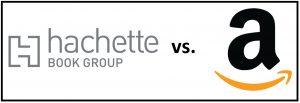 Late-night comedy hosts and political radio pundits love Presidential elections. No matter who wins, they’re guaranteed four more years of great material. I feel kind of the same way about the Amazon/Hachette spat currently going on. There are so many great articles coming out, and I am desperately trying to resist the temptation to blog them all!
Late-night comedy hosts and political radio pundits love Presidential elections. No matter who wins, they’re guaranteed four more years of great material. I feel kind of the same way about the Amazon/Hachette spat currently going on. There are so many great articles coming out, and I am desperately trying to resist the temptation to blog them all!
Let’s see here: the Minneapolis StarTribune has an interesting story about public reactions to the Amazon-Hachette spat at BookExpo. As might be expected, the reaction by the general public was generally positive toward Amazon and “Huh? Who’s that?” toward Hachette. Most attendees were more concerned about autographs than Amazon. “There’s a lot of people who are battling Amazon,” one attendee said.
But my favorite bit of the article has to be this paragraph (emphasis added):
For the publishing world, Amazon’s fight with Hachette upends an otherwise stable moment for the industry. Independent booksellers appear to be opening more stores than closing them and growth in the e-book market has eased to a more manageable pace. E-sales are believed to be around 30 percent of overall sales, well below what Simon & Schuster CEO Carolyn Reidy and others expected a few years ago.
So, there are more bookstores opening than closing now? I remember a few years ago people were concerned independent bookstores were an endangered species. I wonder what might have changed in the publishing industry to bring them back? Could it be one major bookstore chain shuttering and another suffering under pressure from Amazon, combined with publishers suddenly turning all solicitous and mounting a “save the whales” campaign to offer them better terms because of also coming under pressure from Amazon? Perhaps it’s also because they can offer the sort of friendly in-person service that neither Amazon nor Barnes & Noble can? One thing’s for sure, you certainly don’t see record stores making a comeback.
And lest you thought there were only a pro-Amazon/anti-Big Five and a pro-Big Five/anti-Amazon faction, here’s an article from Michael Wolff on USA Today, who thinks they’re all a bunch of doodyheads. He calls out the publishers for their poor business acumen in letting themselves be a punching bag first for Barnes & Noble, then for Amazon, and calls out Amazon for its harsh business tactics.
So, broadly, the fight is between, on the one hand, the incompetents, craven panderers and mid-level corporate bureaucrats in the book business and, on the other, the authoritarian creepos at Amazon. More specifically, the fight is about better and lesser businesses’ acumen and strategies.
The publishers’ fundamental problem is that they gave up their direct path to consumers. They no longer have direct brick and mortar retail outlets, sophisticated distribution networks, and so on. They gave up that power, and it largely has accreted to Amazon. The publishers don’t really have many viable alternatives left to Amazon in their current position of weakness. Perhaps they should get started building some.
And here’s an op-ed in the Financial Times (paywalled, but you can bypass that by Googling the headline) by Martin Shepard, co-publisher of The Permanent Press, who also wrote the blog post Amazon linked in its recent statement on the dispute with Hachette.
Shepard characterizes the complains that Amazon is too powerful as a smokescreen by publishers who have grown fat and lazy and see their decades-long control of the book market slipping away.
From an independent publisher’s point of view, Amazon is a forest in which a thousand flowers bloom. The company offers better terms than other retailers. We used to have to print enough copies to stock every bookshop, knowing that many of them would end up being returned unsold. But Amazon, which holds stock only in a few central warehouses, almost never makes returns. This allows us to shorten our print runs. Its algorithms put our titles in front of customers who might want to read them, surpassing even the best curated boutique. And it pays promptly.
If none of this impresses the biggest publishing houses, that may be because Amazon is also a great leveller. Displaying your books prominently in physical stores costs publishers a pretty penny, giving an advantage to companies such as Hachette that can spend lavishly on marketing. On Amazon, though, every book is displayed the same way. It is easier for titles to find their niche. Independent publishers have a chance.
The “thousand flowers bloom” analogy might be a bit unfortunate, but it’s good to see this point of view reflected in a major media outlet. Of course, the publishing industry partisans counter with the fear, uncertainty, and doubt that Amazon is only being nice to fool everyone and once they have things their way they’ll tighten up the reins. But most independent publishers are well aware of that, and are too concerned about making what money they can make right now to worry what Amazon might do later. After all, the more money they make now, the more cushion they’ll have to deal with it if it happens.
And finally, here’s a piece from investor advice site Seeking Alpha. It’s by and large another run-of-the-mill Amazon hit piece, calling Amazon “massively overvalued, yet massively unprofitable,” talking about all the various controversies surrounding Amazon (employee treatment, sales tax avoidance), and so on. Generally unremarkable, but there’s this curious paragraph:
E-Book Market is Not a Profitable Business, Long Term
Hardware has, and always will be, a commodity. Amazon loses money on the hardware it produces, and hopes to recoup its revenue in the E-book market. The trouble however, is that at some point this business will be commoditized. E-book rights will trade on an open market, and hardware will be produced cheaply oversees by competitors.
E-book rights will trade on an open market? How is that going to happen? What’s it going to look like? Anyone have any idea what this person is talking about? It’s a puzzler.
































Quote: “The publishers’ fundamental problem is that they gave up their direct path to consumers.”
I suspect this should say that publishers realized too late that, in our new digital world, they needed to build, for the first time, a direct path to consumers that included purchasing information.
A few decades back the publishers sold, perhaps through wholesalers, to bookstores. The publishers, at best, knew what bookstores were buying particularly books. In an era before credit cards and personal computers, neither had a good way to track who bought an one book much less what sorts of books each individual customer was buying.
That changed with Amazon. During interviews in the late 1990s Jeff Bezos often thought he would wow reporters by showing what books someone important was buying. Some reporters found that creepy. So did I.
A lot has changed. In the 1950s and 1960s, there were book clubs, often monthly and linked to a particular type of book, that knew what books their customers had bought. Some were linked to major publishers. Some were not. But the data collected was very rudimentary.
So no, the publishers never gave up any direct link. The simply failed to recognized that a new technology, sometimes call Big Data, was creating the ability to create data links, to say, “Oh, you like this book and that one, maybe you’d like this new release.” Bookstore owners could do that with customers they knew well. Now that was possible for a distant publisher.
My suggestion is that, at least for ebooks, publishers offer a free supplement or novelette that’s only available from them and only by choosing (or not) to be placed on a mailing list for that author or that sort of ebook. That’d let these publishers bypass Amazon and establish some direct relationships. And over time, they could steer those relationships in either direct sales or sales that go to someone other than Amazon.
Nothing. The predictions were stupid, is all. Just like the idea that e-books were going to completely replace print books. Or that they would turn out to be a fad.
People always think there is One True Way of doing everything. And there never is.
Well, Michael, the article says
So it appears they at least had some retail outlets.
By the way, Michael, did you see this article that called you out by name?
There’s so much wishful thinking based on non-facts in this short piece that it’s hard to find any actual bits of real information. I’ll list my counterpoints and move along:
1. major publishers are in no danger and, although they move slowly to adapt, due to their size and the massive investment required to shift gears, they move powerfully.
2. indie bookstores continue to fail, and their numbers are a fraction of what they once were.
3. major chain bookstores are now down to one: Barnes and Noble, which is fading fast.
4. small publishers are not celebrating and do not see Amazon as “nice,” nor is this a golden age of the gold rush; Amazon is brutally dominant over all its vendors, large and small, and soon the naive world of self-published authors will understand that they have locked themselves into the Big A’s control, too.
5. Pretty much everything else that was said in this article is ignorant about the actual business of publishing, bookselling, trends, and predictions.